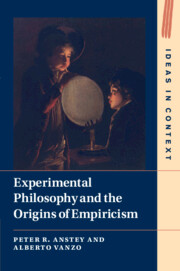
-
Select format
-
- Publisher:
- Cambridge University Press
- Publication date:
- February 2023
- February 2023
- ISBN:
- 9781009030236
- 9781316516461
- 9781009015585
- Dimensions:
- (229 x 152 mm)
- Weight & Pages:
- 0.73kg, 380 Pages
- Dimensions:
- (229 x 152 mm)
- Weight & Pages:
- 0.549kg, 380 Pages
- Subjects:
- History of Science and Technology, History of Ideas, History, History of Ideas and Intellectual History
- Series:
- Ideas in Context (145)
You may already have access via personal or institutional login- Subjects:
- History of Science and Technology, History of Ideas, History, History of Ideas and Intellectual History
- Series:
- Ideas in Context (145)
Book description
The emergence of experimental philosophy was one of the most significant developments in the early modern period. However, it is often overlooked in modern scholarship, despite being associated with leading figures such as Francis Bacon, Robert Boyle, Isaac Newton, Jean Le Rond d'Alembert, David Hume and Christian Wolff. Ranging from the early Royal Society of London in the seventeenth century to the uptake of experimental philosophy in Paris and Berlin in the eighteenth, this book provides new terms of reference for understanding early modern philosophy and science, and its eventual eclipse in the shadow of post-Kantian notions of empiricism and rationalism. Experimental Philosophy and the Origins of Empiricism is an integrated history of early modern experimental philosophy which challenges the rationalism and empiricism historiography that has dominated Anglophone history of philosophy for more than a century.
Reviews
‘The book is a must-read for both supporters and critics of ESD [experimental and speculative philosophy]. It is also essential reading for students of early modernity researching the intricate relationship between philosophy and the sciences.’
Laura Georgescu Source: Metascience
Contents
Metrics
Altmetric attention score
Full text views
Full text views help Loading metrics...
Loading metrics...
* Views captured on Cambridge Core between #date#. This data will be updated every 24 hours.
Usage data cannot currently be displayed.
Accessibility standard: Unknown
Why this information is here
This section outlines the accessibility features of this content - including support for screen readers, full keyboard navigation and high-contrast display options. This may not be relevant for you.
Accessibility Information
Accessibility compliance for the PDF of this book is currently unknown and may be updated in the future.


